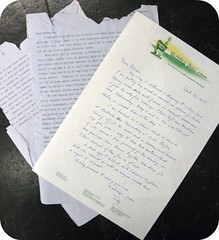
Rebecca West (1892-1983) was born Cecily Isabel Fairfield in London. West’s childhood was not ideal; her father abandoned the family in 1901, an event that would resonate later in West’s writing. West attended a number of schools rather erratically, discouraged by her educators’ lack of interest in her potential. Her short tenure at the Academy of Dramatic Art in London (1910-11) prompted her to assume the name Rebecca West, the heroine of Ibsen’s Rosmersholm, in her professional as well as personal life. In 1907, she began her journalism career with a letter to the editor published in The Scotsman. West’s journalism reveals her interest in women’s rights and issues pertaining to imperialism and class. It was her review of H.G. Wells’s novel Marriage, however, that had a profound impact on her personal life. Intrigued by West’s review, Wells invited her to tea; this meeting developed into a lengthy love affair and the birth of a son, Anthony Panther West, in 1914. While raising their son, West wrote a book on Henry James (1916), The Return of the Soldier (1918), The Judge (1922), and contributed literary reviews to the Daily News. West began a literary tour of the United States in 1923 after ending her romantic relationship with Wells. She continued to write prolifically throughout her life, writing works in the field of literary criticism, The Strange Necessity (1928) and The Court and the Castle (1957), as well as political essays, The Meaning of Treason (1947) and Train of Powder (1955). West also continued to write fiction, such as Harriet Hume (1929) and The Birds Fall Down (published in 1966, but begun in the 1930s).
The University of Tulsa’s holdings in Rebecca West materials are extensive and attract scholars from around the world. The Rebecca West Papers are a vast collection of her correspondence, writings, and personal papers. Additionally, we own smaller collections devoted to West, such as the Gillian Parker – Rebecca West materials, the Norman MacLeod archive of Rebecca West, and the Richard Rosser photo-negatives of Rebecca West.

